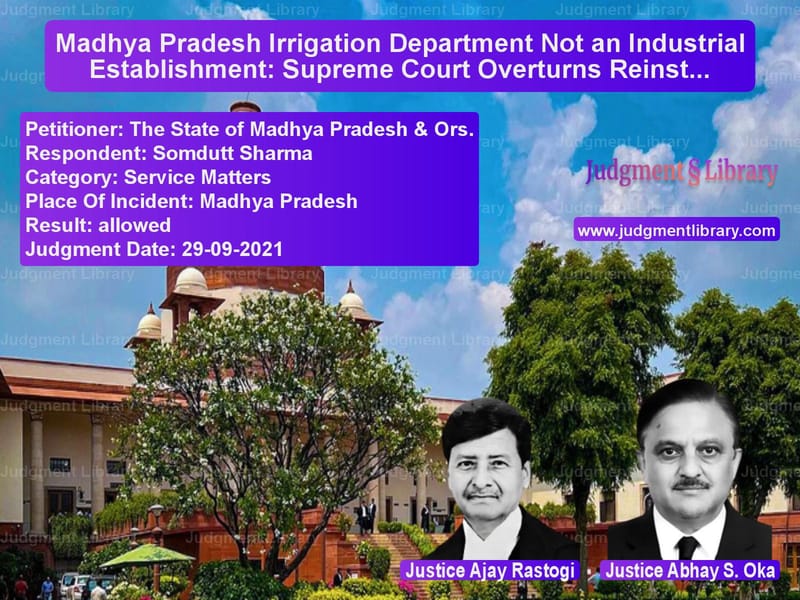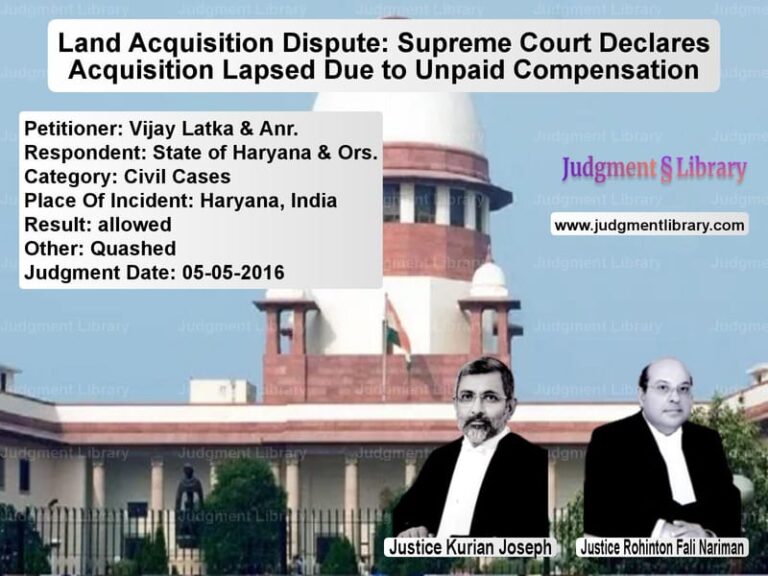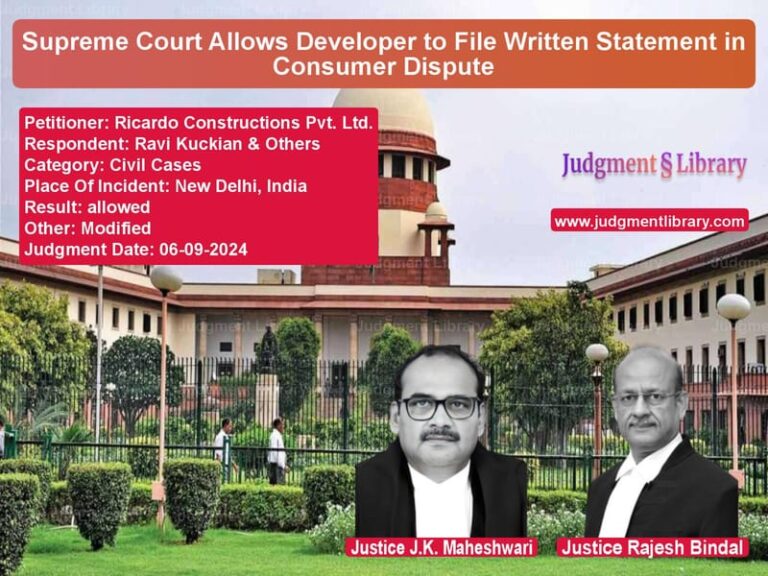Madhya Pradesh Irrigation Department Not an Industrial Establishment: Supreme Court Overturns Reinstatement Order
The case of The State of Madhya Pradesh & Ors. v. Somdutt Sharma revolved around the termination of a daily wage employee in the Irrigation Department and the legal applicability of the Industrial Disputes Act, 1947 (ID Act). The Supreme Court was called upon to determine whether the Irrigation Department qualifies as an ‘industrial establishment’ under the law, and whether the reinstatement of the worker, as ordered by the Labour Court, was justified.
Background of the Case
Somdutt Sharma, the respondent, was initially appointed as a daily wage Helper in the Irrigation Department of the State of Madhya Pradesh. His employment was terminated on December 1, 1995. However, based on the directions of the Chief Minister, he was reinstated on August 11, 2004. His employment was again terminated on July 2, 2005.
Following his second termination, Sharma raised an industrial dispute, which was referred to the Labour Court at Gwalior. The Labour Court ruled that the termination violated Section 25N of the Industrial Disputes Act, 1947, which mandates prior permission from the appropriate government before retrenching an employee in an industrial establishment. As a result, the Labour Court ordered Sharma’s reinstatement but denied him back wages.
Read also: https://judgmentlibrary.com/supreme-court-rules-on-indian-forest-service-promotion-dispute/
The Madhya Pradesh government challenged this decision, but both the Single Judge Bench and the Division Bench of the High Court upheld the Labour Court’s decision. Dissatisfied with the verdict, the State of Madhya Pradesh filed an appeal in the Supreme Court.
Key Issues Before the Supreme Court
- Whether the Irrigation Department qualifies as an industrial establishment under Section 25L of the Industrial Disputes Act.
- Whether the provisions of Chapter VB of the ID Act, particularly Section 25N, applied to the termination of Sharma’s employment.
- Whether Sharma’s termination was legally justified.
Arguments by the Appellants (State of Madhya Pradesh)
The state government argued that:
- The Irrigation Department is not an ‘industrial establishment’ under Section 25L of the ID Act because it is not a factory under the Factories Act, 1948.
- The department’s primary function is to construct and maintain water resources and manage disaster control, which does not fall under the definition of manufacturing.
- The Labour Court failed to examine whether Section 25N applied before ruling in favor of Sharma.
- The state had already complied with Section 25F of the ID Act, which only requires payment of retrenchment compensation and notice before termination.
Arguments by the Respondent (Somdutt Sharma)
Sharma’s counsel contended that:
- The Irrigation Department engages in pumping water, which qualifies as a ‘manufacturing process’ under the Factories Act, 1948.
- As the department employed more than 100 workers, it should be classified as an ‘industrial establishment’ under Section 25L.
- The state failed to comply with Section 25N of the ID Act, which mandates prior approval from the government before terminating employees.
- The decisions of the Labour Court and the High Court were legally sound and should not be overturned.
Supreme Court’s Analysis
The Supreme Court, comprising Justices Ajay Rastogi and Abhay S. Oka, examined whether the Irrigation Department meets the criteria of an ‘industrial establishment’ under Section 25L of the ID Act. The Court focused on the definition of ‘factory’ under the Factories Act, which requires a manufacturing process to be carried out.
Key Findings
- The Irrigation Department is not engaged in a manufacturing process within the meaning of the Factories Act.
- Although some employees in the department might operate water pumps, this does not make the entire department a factory or an industrial establishment.
- Overall, the department’s primary function is water management, not manufacturing.
- Since the department does not qualify as an industrial establishment, Chapter VB of the ID Act, including Section 25N, does not apply.
- The state had already complied with Section 25F of the ID Act by providing Sharma with retrenchment compensation.
Key Observations by the Supreme Court
“Few employees of the Irrigation Department may be incidentally operating pumps. But the test is what are the predominant functions and activities of the said department. Even if some employees operate pumps, the Irrigation Department does not carry on manufacturing processes.”
“As it is not carrying on manufacturing processes, it is not a factory within the meaning of Section 2(m) of the Factories Act. Therefore, the Irrigation Department of Madhya Pradesh is not an ‘Industrial Establishment’ under Section 25L of the ID Act.”
Final Judgment
The Supreme Court ruled in favor of the Madhya Pradesh government and set aside the orders of the Labour Court and the High Court. The Court held that Sharma’s termination was legal and valid. It also stated that there was no need to obtain prior government approval before terminating his employment, as Chapter VB of the ID Act did not apply.
Implications of the Judgment
This ruling has significant implications for labor law in India:
- Clarification on Industrial Establishments: The Supreme Court clearly distinguished between government departments engaged in public service and industrial establishments.
- Reinforcement of Legal Requirements: It affirmed that compliance with Section 25F (retrenchment compensation) is sufficient if Chapter VB does not apply.
- Protection for Government Operations: The ruling prevents government departments from being classified as industrial establishments unless they engage in manufacturing.
Conclusion
The Supreme Court’s decision in The State of Madhya Pradesh v. Somdutt Sharma provides a clear precedent on how labor laws apply to government departments. By ruling that the Irrigation Department does not qualify as an ‘industrial establishment,’ the Court reinforced the principle that statutory protections for workers must be interpreted within the correct legal framework. The judgment ultimately protects government operations from unnecessary litigation while ensuring that employees receive fair treatment under applicable labor laws.
Petitioner Name: The State of Madhya Pradesh & Ors..Respondent Name: Somdutt Sharma.Judgment By: Justice Ajay Rastogi, Justice Abhay S. Oka.Place Of Incident: Madhya Pradesh.Judgment Date: 29-09-2021.
Don’t miss out on the full details! Download the complete judgment in PDF format below and gain valuable insights instantly!
Download Judgment: the-state-of-madhya-vs-somdutt-sharma-supreme-court-of-india-judgment-dated-29-09-2021.pdf
Directly Download Judgment: Directly download this Judgment
See all petitions in Employment Disputes
See all petitions in Termination Cases
See all petitions in Public Sector Employees
See all petitions in Judgment by Ajay Rastogi
See all petitions in Judgment by Abhay S. Oka
See all petitions in allowed
See all petitions in supreme court of India judgments September 2021
See all petitions in 2021 judgments
See all posts in Service Matters Category
See all allowed petitions in Service Matters Category
See all Dismissed petitions in Service Matters Category
See all partially allowed petitions in Service Matters Category






